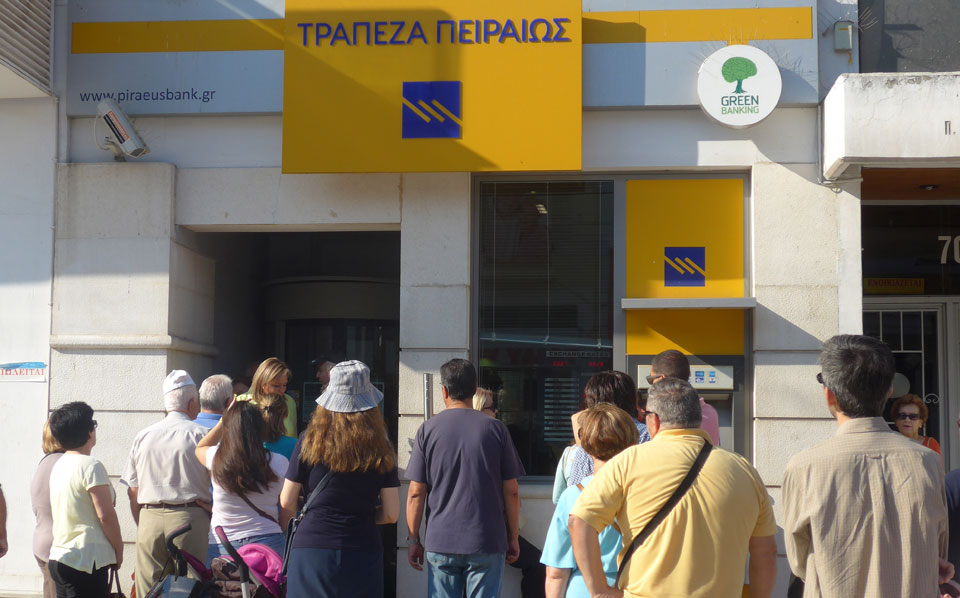Recap won’t be enough for credit sector

The Greek economy will have to grow at satisfactory rates for many years to recoup the severe output loss recorded during the 2008-15 period, and perhaps 2016 too. This is not likely to happen if the private sector is not properly funded by bank. The third recapitalization of local credit institutions since 2012 aims to address this issue by shoring up their capital to deal with the large stock of bad loans. However, banks will not be able to accommodate the credit needs of the private sector unless they boost their liquidity as well, namely deposits.
The local credit institutions are getting ready for the third recapitalization in the last few years and their fourth since 2008 in a bid to deal with the huge pile of nonperforming loans (NPLs), estimated at more than 45 percent of their gross loans on average. This is a major step in the right direction but it is not a panacea, as we have said in the past. It is important for banks to have a high capital adequacy ratio but they also have to have ample liquidity to be able to provide credit to the healthy private sector.
Greek banks have relied on funding from the European Central Bank (ECB) and the Emergency Liquidity Assistance (ELA) of the Bank of Greece to substitute the loss of deposits in the previous quarters, but this cannot go on for ever. They have borrowed more than 80 billion euros from the Eurosystem to bridge the gap between deposits and loans and have lost access to capital markets. Undoubtedly, a successful recapitalization should have a positive impact on economic sentiment, foster confidence in the banks and help attract some deposits back.
However, we don’t think the recapitalization will suffice to do the job. It will take a long time of political stability and economic normalcy to restore Greek savers’ faith in the system, following their bitter experience with the capital controls in the summer. This does not mean that one should not expect the return of a few billion in deposits in the next six months or so, assuming everything else goes well. The 2012 episode may be enlightening in our view.
To start with, total deposits and repos (repurchase agreements) in the Greek banking sector reached 159 billion last September, up 650 million compared to June but considerably lower than about 209 billion in December 2014. The sum had stood at about 213 billion at end-2013 and almost 219 billion in December 2012.
The picture one gets by breaking down this amount and focusing on the savings of local households, nonprofit organizations and companies is the following:
Households and firms held deposits of about 121.7 billion euros in September, up 570 million compared to the previous month but still down compared to 122.2 billion in June. Private sector savings amounted to 160.3 billion last December, which translates into withdrawals of almost 39 billion euros in the first nine months of this year. It is noted that private deposits had stood at about 163.2 billion in December 2013.
One way to gauge what could happen to private deposits this time around is to observe the behavior of Greek private depositors in 2012, another year characterized by high political uncertainty. In April 2012, just after the largest sovereign debt restructuring in history, known as PSI (Private Sector Initiative), households and companies had 166 billion euros in the banks.
However, deposits fell to 150.6 billion in June of the same year, when the second election took place, and rose to 161.5 billion at end-2012 on the back of receding political uncertainty and the return of normalization in the economy. They rose by less than 2 billion euros in the next 12 months to reach 163.2 billion at end-2013 on the heels of an overall improvement in the economic environment and public finances.
The lesson, in our view, is simple. Private deposits can easily take flight, but it is difficult to bring them back. Even if some of them return, it will be a portion of the money withdrawn. Unfortunately, some deposits will never return, giving rise to a “structural liquidity deficit” in the banking sector that will take several years to shrink, assuming political stability and a return to economic growth.
If one wants to extrapolate the 2012 episode to the current period, it is reasonable to predict a rise in private deposits in the next few months, assuming progress is made in the implementation of the third economic program and political stability is established. In 2012, about 24 billion euros had been withdrawn from the start of the year to the June trough and about 11 billion returned to the system by year-end. If we do the same exercise now, we could expect private deposits to be boosted by about 18 billion euros in the next six to eight months. It will be a positive development but it will likely go toward replacing funding from the Eurosystem since banks will try to reduce their dependency.
Of course banks could obtain access to capital markets again and borrow more from the interbank market in the coming months if everything goes smoothly. Still, the liquidity that may come from these sources is likely to be limited – especially after the banks’ latest offer to holders of their debt instruments to exchange them for cash or common shares in the context of the recapitalization.
All in all, even if the bank recapitalization is successfully completed, it will likely take quite some time and effort for credit institutions to win back some of the deposits that left the system. However, this does not bode well for the provision of credit to the private sector in the foreseeable future despite the recapitalization of the banks.
[Kathimerini English Edition]





